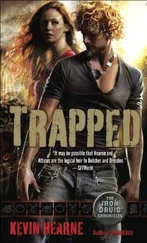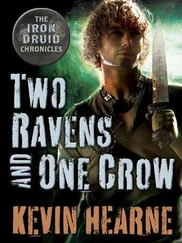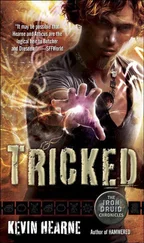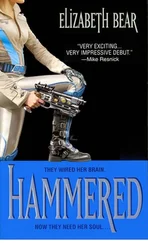That is when I came to the New World. I picked a desert in the southwest of the continent and waited. It was a long, mind-numbing wait, but it proved to bear fruit, for the Druid finally appeared, did he not? I could not simply charm him and force him to bring me here; he is well defended against such intrusion. I had to charm him the way humans do it: I befriended him and earned his trust. Soon we will shift to Asgard, and my millennium of suffering will end one way or another.
I have paid with centuries of anguish for one night’s drunken boasting. I have endured much for the sake of revenge. But when I get my chance, friends, I will be swift. I will not gloat over the thunder god or try to make him suffer. The point is not to cause him pain but rather to end mine. No matter how quickly Thor dies, it will be too late for my family.
* * *
Well, that was revelatory. When I met Leif shortly after moving to Tempe, I never suspected then, or at any point afterward, that he’d been waiting for me there. For centuries. Or that, for him, all our professional and personal acquaintance was nothing more than a prelude to pursuing his own vendetta.
I felt hurt for the space of a mouse whisker—“He used me!” a tiny voice said—but then I laughed at myself. He was a vampire , after all. To them, all other creatures are to be used as they see fit. Leif had fooled me into thinking that he was different.
But I was not the only fool. The expression on Gunnar’s face told me he was thinking similar thoughts. The question was, did this new information change anything?
Leif had given his word and followed through on it. I had given mine, and that is no small matter for one of my generation. People today make promises, break them blithely, and then excuse themselves by saying “I tried” when in truth they did not. For people of the Iron Age—my age—a man’s word was the foundation of his reputation, the underlying architecture of his honor, the bedrock of his identity. Even though I often lie—a very different thing—I never forswear myself. I couldn’t get around that. Or the fact that Thor could use a good killing.
But, thanks to Jesus, I had my doubts that slaying Thor would be an unequivocally good idea, even though all evidence suggested he might be an unmitigated asshole. The function of assholes in the world, just like the asshole we all have, is to spread shit around. They are loathsome and dirty and smell extraordinarily bad, but they are also vitally necessary.
That thought led me to consider the nature of vampires. Were they vitally necessary? What niche did they fill in the scheme of things?
Despite the impenetrable curtain Leif had drawn over his undead secrets, I knew something about vampires he’d probably rather I didn’t know. He couldn’t hide it from me, because I could see it.
Normal people churn with life and their bindings to the earth; the activity of their minds and their relative health is clear from their auras, which suffuse their entire being. Vampires are different in that there are only two clear areas of “being” at all. There is activity in the center of their rib cages, and there is activity directly behind the eyes, a dull red pulsing glow like coals in a fire. The rest of them comes across as nothing more than a sterile yet ambulatory collection of carbon, calcium, and iron, though they do have thin gray auras around their heads and torsos.
Those red lights, whatever they are—the dark magic of vampirism Leif refused to explain—they are fail-safes of a sort. I think of them as resurrection engines. That’s why you can’t just stake a vampire in the heart and assume you’re done; you have to cut off the head as well to prevent regeneration, because if someone removes that stake, it’ll heal up and the vampire will rise again. Even then, if you cut off the head and remove the stake, the heart will grow a new head eventually. You’ll have a thin and wasted-looking vampire, but it will be tremendously hungry and feed incessantly until it gets back to full strength.
Theories in Druid lore speculate that vampires are completely alien, or else demonic symbionts brought to this plane long ago. It mattered little to me which was true, because the upshot of it was that I could do whatever I wanted to vampires. As far as the earth is concerned, vampires don’t exist as sentient creatures. They are simply collections of minerals and elements that have yet to be reabsorbed, and as such I could unbind them whenever I wished. Druids have absolutely no tabus against using our magic on the dead—it’s only the living we can’t mess with.
My private theory about the downfall of the Druids—which I didn’t share with Granuaile when she asked, except in passing—has quite a bit to do with vampires. In my opinion, Caesar was simply a sword wielded by the hands of vampires in Rome. There was (and still is) a well-known nest there, and I think they were working behind the scenes, pushing the Senate to have Druidry wiped out. The young vampires wanted to expand northward and carve out territories of their own, but the continental Druids in Gaul were preventing that expansion by unbinding the vampires on sight, turning them into a mush of protoplasm and then setting the mess on fire to prevent any chance of resurrection.
I would have done the same to Leif when I first met him, if Hal had not introduced us and taken care to warn me ahead of time that he was very nice for a dead guy. Though I was aloof at first, gradually I realized that Hal was right and I came to enjoy Leif’s company—even considering him a friend. I was not sure anymore if Leif’s regard for me had ever been genuine.
His tale also made me wonder if he knew what I could do to him if I so chose. He became a vampire after the fall of the Druids, and most likely his maker, Zdenik, had as well—though I was basing that guess entirely on his ethnic name and the conjecture that vampires had not yet penetrated into Bohemia by the sixth century. But Zdenik had probably been made by one of the Romans, and they could have told him what Druids could do, and he in turn could have told Leif. I suspected that asking Leif about it would be wasted breath, so I cleared it from my mind. Something else leaped in to occupy it, a horrible gestalt that had been bubbling up to the surface all the while.
Leif knew I’d have doubts after he said those things, and he also knew with full certainty that I’d take him to Asgard anyway. Why?
The chilling conclusion I reached was that I had given Leif my word, and any creature capable of waiting for centuries to get his revenge would not hesitate to use any leverage he could to ensure I followed through. Any creature capable of suffering what he had suffered would not blanch at inflicting a bit of suffering on others. He knew who my loved ones were. He knew where they lived.
Almost as soon as I thought this, I rejected it as unworthy. No one could be so Machiavellian. Not even Machiavelli.
And the simple solution—to unbind him like any other vampire and have done with it—was not so simple, aside from being completely dishonorable. He had drunk gallons of my blood; it was part of him now. If I unbound him, might I do some damage to myself in the process? I had no way of knowing. There was no precedent for this. And now was not the time for figuring it all out, because people were staring at me and I wasn’t sure why. Had I been thinking aloud?
Zhang Guo Lao cleared up my confusion by politely inquiring if we had bonded sufficiently for a trip to Asgard.
“Oh. We have made excellent progress,” I replied, extremely relieved that this was all he wanted to know. “But more must be done, I’m afraid.”
Читать дальше











